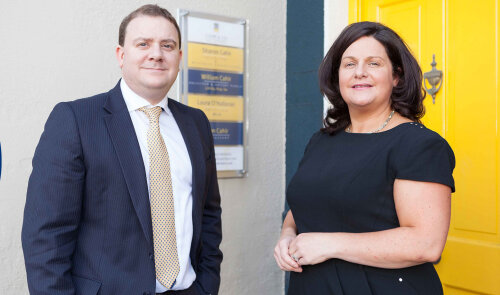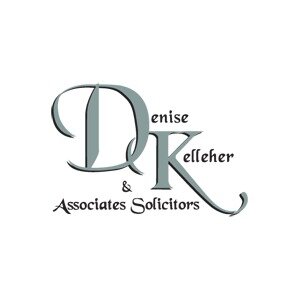Best Trusts Lawyers in Ireland
Share your needs with us, get contacted by law firms.
Free. Takes 2 min.
Or refine your search by selecting a city:
List of the best lawyers in Ireland
About Trusts Law in Ireland
Trusts are a fundamental aspect of the legal landscape in Ireland, serving as a legal arrangement where a trustee holds and manages assets for the benefit of beneficiaries. The law surrounding trusts in Ireland is primarily derived from common law, and specific statutory provisions, with influences from historical legislation. Trusts can be used for various purposes, including estate planning, asset protection, and charitable objectives. They provide a flexible and robust way to manage and convey assets while ensuring adherence to the wishes of the asset owner and the protection of beneficiaries.
Why You May Need a Lawyer
Legal assistance in the field of trusts is often necessary for several reasons. Firstly, setting up a trust requires meticulous legal documentation to ensure compliance with Irish law and to accurately reflect the settlor's intentions. Situations that commonly necessitate legal help include estate planning, where trusts are established to manage inheritance matters, or in cases of asset protection, where the proper structuring of a trust can shield assets from creditors. Disputes over the interpretation of a trust document or the conduct of a trustee may also require professional legal counsel. Additionally, changes in the family structure, such as marriage, divorce, or the birth of a child, may necessitate the review and modification of existing trust arrangements.
Local Laws Overview
In Ireland, trusts are governed by a combination of common law and statutory instruments, such as the Trustee Act 1893 and the Land and Conveyancing Law Reform Act 2009. Key aspects of local laws relevant to trusts include the duties and powers of trustees, the rights of beneficiaries, and rules regarding the creation and termination of trusts. The role of the trustee is particularly significant, with legal obligations to act in the best interests of the beneficiaries, maintain impartiality, and manage the trust property prudently. Testamentary trusts, living trusts, and charitable trusts each have particular legal requirements and operational nuances under Irish law.
Frequently Asked Questions
What is a trust?
A trust is a legal arrangement where one party, known as the trustee, holds property or assets for the benefit of another party, the beneficiary.
How is a trust created in Ireland?
A trust in Ireland is typically created through a legal document called a trust deed or as part of a will. It must clearly outline the trust's purpose, the assets involved, the trustee, and the beneficiaries.
Who can act as a trustee?
A trustee can be any individual or corporation capable of holding property. It is crucial they are trustworthy and competent to manage the trust responsibly.
Can a trust be changed after it is established?
Some trusts can be altered by the settlor or the beneficiaries, while others may be irrevocable. Legal advice should be sought to understand the flexibility of a specific trust.
What are the tax implications of setting up a trust?
Trusts can have several tax implications, particularly regarding Capital Gains Tax, Capital Acquisitions Tax, and Income Tax. Consulting a tax specialist is advised.
What is the duration of a trust?
The duration of a trust depends on its terms and objectives. Some trusts terminate after achieving their purpose, while others may last for a specific number of years or even indefinitely.
How can I ensure the trust is managed properly?
Proper management requires appointing competent trustees, ensuring regular accountability and reviews, and possibly retaining professional trust administration services.
Can a trust protect my assets from creditors?
While a properly structured trust can offer asset protection benefits, legal advice is necessary to understand the limitations and ensure compliance with Irish law.
Are there different types of trusts?
Yes, common types include discretionary trusts, fixed trusts, testamentary trusts, and charitable trusts, each serving different purposes and functions.
What happens if a trustee fails to perform their duties?
Beneficiaries can take legal action against a trustee who fails to meet their obligations, which may include seeking damages or a court's removal of the trustee.
Additional Resources
The following resources can provide further assistance and guidance regarding trusts in Ireland:
- The Law Society of Ireland: Offers resources and legal advice related to trusts and estates.
- The Revenue Commissioners: Provides information on tax implications and regulations concerning trusts.
- The Office of the Attorney General: Can provide legal texts and interpretations of trust law.
- Professional associations for accountants and tax advisors: Help with financial planning aspects of trusts.
Next Steps
If you require legal assistance in the field of trusts, consider the following steps:
- Identify your specific needs and objectives for creating or managing a trust.
- Consult with a legal professional specialized in trusts to assess your situation and provide tailored advice.
- Gather relevant documents, such as property deeds and financial statements, to facilitate the consultation process.
- Consider engaging with a professional trustee service if the complexities of managing a trust are overwhelming.
- Keep abreast of changes in legislation that may affect your trust, and ensure it remains compliant with current laws.
Lawzana helps you find the best lawyers and law firms in Ireland through a curated and pre-screened list of qualified legal professionals. Our platform offers rankings and detailed profiles of attorneys and law firms, allowing you to compare based on practice areas, including Trusts, experience, and client feedback.
Each profile includes a description of the firm's areas of practice, client reviews, team members and partners, year of establishment, spoken languages, office locations, contact information, social media presence, and any published articles or resources. Most firms on our platform speak English and are experienced in both local and international legal matters.
Get a quote from top-rated law firms in Ireland — quickly, securely, and without unnecessary hassle.
Disclaimer:
The information provided on this page is for general informational purposes only and does not constitute legal advice. While we strive to ensure the accuracy and relevance of the content, legal information may change over time, and interpretations of the law can vary. You should always consult with a qualified legal professional for advice specific to your situation.
We disclaim all liability for actions taken or not taken based on the content of this page. If you believe any information is incorrect or outdated, please contact us, and we will review and update it where appropriate.
Browse trusts law firms by city in Ireland
Refine your search by selecting a city.
















